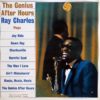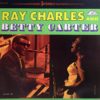Ray Charles And Betty Carter
Album by Ray Charles and Betty Carter
In the midst of a super-busy year for Ray Charles came his July 1961 LP of ballads with Betty Carter, titled simply Ray Charles And Betty Carter. Aside from being a series of romantic duets that tell the sexy story of a new, budding relationship, the album has a couples “theme” (just like The Genius Hits The Road had a place-name theme): every song title on Ray Charles And Betty Carter contains words like “us”, “two”, and “together”.
This LP was arranged by Marty Paich and produced by Sid Feller, collaborators whom Ray met at his new label ABC and who would (especially in Feller’s case) work with Ray extensively over the years.
Ray’s fourth album in seven months was recorded over nine hours on June 13 and 14, 1961, but feels slow and considered rather than rushed. While it was totally unlike Ray’s 1950s rhythm and blues hits, the public was getting used to this gentler, thickly orchestrated Ray, and the album was a hit thanks to its sweetly passionate textures and the undeniable chemistry between Ray and Betty.
About the songs on Ray Charles And Betty Carter
Cole Porter’s “Ev’ry Time We Say Goodbye” begins the album, a curious choice (being an introductory song about goodbyes) but appropriate for establishing the bond between the album’s male and female roles. Ray comes first, crooning the opening two verses with a warm and enveloping fragility before Betty enters, her clean and silvery tones acting as a soft contrast to Ray’s masculine voice.
“You And I”, a hit for Glenn Miller, Bing Crosby, Frank Sinatra, and others, comes next. Betty begins this time, trading lines with Ray in a jazzier arrangement with its playful orchestra making it swing and dominated by a bouncy bass and an extensively soloing saxophone.
“We’ll Be Together Again” (with a brief introduction by Betty using composer Gordon Jenkins’ “Goodbye”) is a classic romantic ballad which finds Ray singing in his heartbreakingly emotive style over the daring melody and then supporting Betty Carter’s dulcet turns at the mic with ostentatious but still sympathetic piano melodies.
Rodgers and Hammerstein’s “People Will Say We’re In Love” opens with Betty’s clear voice gigglingly admonishing the man’s minor public attentions, and Ray concurs from his own point of view. “Sweetheart, they’re suspecting things,” the perhaps-lovers fret. Like “You And I”, “People Will Say We’re In Love” bobs along on a wandering bass line and with a swaying brass section.
Slow and milky, “Cocktails For Two” ignores the comical Spike Jones version and hearkens back to the original 1934 version, and the evening depicted by Ray Charles And Betty Carter is moved along: Betty, in her highest registers, offers mock worry that she’ll get tipsy from the drinks, but isn’t objecting; Ray steps in only when necessary, nudging her gently in the direction they both want but mostly letting her get comfortable with the evening in her own time.
Side 1 ends with the fun, rapid-fire “Side By Side”, and for the first time Betty and Ray are singing the same thing at the same time before Betty goes off into her own solo verses. A lighthearted moment of joy at simply being together, “Side By Side” features another saxophone solo and then a jazzy piano solo from Ray. Ray in fact lets his keys do the talking on this quick, jaunty performance – Betty is always singing, Ray only joins her sometimes and doesn’t need any solo spots for his own voice.
Side 2 of Ray Charles And Betty Carter opens with perhaps its most famous number, the entertaining and relatable “Baby, It’s Cold Outside”. Ray does everything he can to convince his woman to stay just a little longer – here Betty, have another drink, this roaring fire is so nice, and after all it’s so cold outside – the snow is up to your knees! Betty puts up token resistance – I really must be going, and what will my mother say? – but doesn’t take much persuading. It’s a fine moment of humor, warmth and sexy interplay between the two.
When the two lovers-to-be aren’t having their back-and-forth conversation, sharp and dramatic minor-key blasts from the otherwise somnolent band add some unusual drama to the song. By the song’s end, the two are again singing together; the evening is proceeding well.
Next comes “Together”, a fast and jazzy song about… well, being together. It’s a simple and very short song – a minute and a half – and seems to once and for all report the success of “Baby, It’s Cold Outside”.
“For All We Know” is another lush and romantic duet, led off by a beautiful Betty vocal and given its manly depth by Ray’s enthusiastic, able singing. Paich’s sensitive strings add just the right amount of gentleness while Ray gets another remarkable-as-usual piano solo.
Pearl Bailey’s Number One hit from 1952, “Takes Two To Tango”, breaks from the other music of Ray Charles And Betty Carter with a rhythmic, danceable meter and an adventurous mixture of funny lyrics and catchy melodies. For once, Betty Carter gets to break out of her “sultry angel” persona and abandon herself to a broader, more exultant performance. With its strange and sly references to getting into bed and licking stamps, “Takes Two To Tango” is a rather overt sign pointing to the evening’s progress.
The otherworldly “Along Together” finds the two lovers openly expressing their devotion to one another; the playfulness of some of the recent songs, and the coy winking of much of Side 1, are completely gone, leaving the pair’s stark professions of love to pass back and forth without qualification or adornment. Ray’s lovely piano and Paich’s voluptuous orchestra, plus a snow-white choir, help “Alone Together” become the most dramatic and moving of the album’s performances.
A successful evening such as the one described over Ray Charles And Betty Carter‘s previous eleven songs must be wrapped up with a final send-off, and it comes in the form of “Just You, Just Me”, a much more playful and deliriously happy restating of the feelings communicated by “Alone Together”. “Oh GEE!” says Ray, a helpless smile on his face, as the pair promise to “tie a lover’s knot around wonderful you.”
Short and fun, “Just You, Just Me” ends the album with sentiments that not only bring together its sly ups and downs into a neat conclusion, but also sets the stage for a successful future for the two. The interplay between Ray and Betty works well, and the LP tells the story with its series of convincing, endlessly enjoyably romantic moods.
Record covers
Under a loud green banner with the singers’ names, the front cover of Ray Charles And Betty Carter is split with two simple photos: one of Ray singing and playing piano in the studio, the other of Betty in a light dress singing into a microphone.
The back cover features a rapturous essay by producer Sid Feller, the track listing, and some technical information about mono and stereo recordings that often featured on vinyl albums at this time. No photos appear on the back.
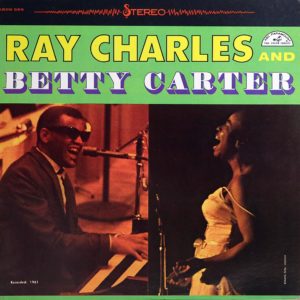
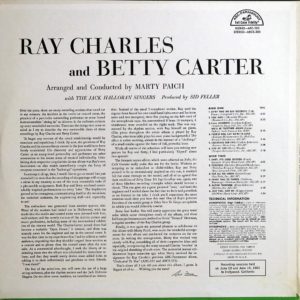
Record labels
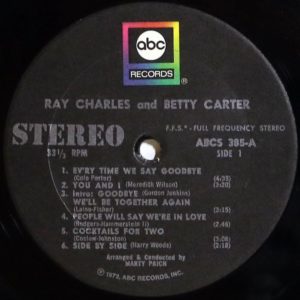
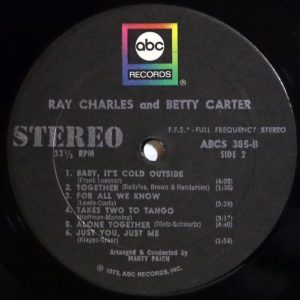
Singles with songs from Ray Charles And Betty Carter
Only one single was issued from Ray Charles And Betty Carter, perhaps understandable since the market was already glutted with Ray product at the time. In fact, it would be several months after the LP release that the single would be available. The B-side does not include the short “Goodbye” intro, sung by Betty Carter, featured on the album.
“Baby, It’s Cold Outside”
b/w
“Goodbye/We’ll Be Together Again”
Track listing
Side A
1. “Ev’ry Time We Say Goodbye”
2. “You And I”
3. “Goodbye/We’ll Be Together Again”
4. “People Will Say We’re In Love”
5. “Cocktails For Two”
6. “Side By Side”
Side B
1. “Baby, It’s Cold Outside”
2. “Together”
3. “For All We Know”
4. “Takes Two To Tango”
5. “Alone Together”
6. “Just You, Just Me”
Listen to Ray Charles And Betty Carter
Original vinyl copies of this famous album are pretty easy to find in good shape for a good price. Note that recent “heavy vinyl” reissues are apparently made without access to the original master tapes, taking advantage instead of European copyright laws and sourced from commercial CDs. Try to hold out for an original ABC pressing; stereo and mono versions are available.
Get your own Ray Charles And Betty Carter on LP, CD or MP3 from Amazon.
